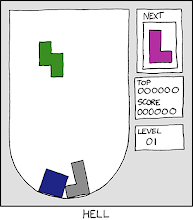Computación para niños, como debería ser !!!!!!!!!!
Primero que cualquier cosa, pienso que la forma de enseñar hoy a los niños es muy mala, solo se dedican a enseñar a prender el PC, en window$ por supuesto, abrir el Office y se les da por aprendido. En mi caso yo aprendi con un programa llamado TURTLE por eso de los 80's (pantalla monocromatica), el cual, es una torugita que se maneja mediante comando y va dibujando en la pantalla, nada más que decir que para un niño de menos de 10 años me cambio la vida, principalmente porque tome noción de como trabaja el computador, además, me ayudo muchisimo en los estudios. Bueno el otro dia me acorde y me encontré que aún existe y con interfaz grafica, entonces, ¿POR QUE NO ENSEÑARLE VERDADERA COMPUTACIÓN A LOS ÑIÑOS?. También descubri otra herramienta, mucho mejor y actual a mi parecer, se llama RURPLE, el cual es muy similar a TURTLE, pero aqui es un robot el cual es manejado con comandos al estilo python, así si le quieren hacer un favor a un niño instalen RURPLE y sigan las lecciones que traen, les va a ayudar mucho, aquí les dejo un video de como niños trabajan con RURPLE, además de un niño trabajando con easygui, haciendo un programa con interfaz grafica con python:
Enlace principal:
http://showmedo.com/videos/series?name=pythonJensFromKidsSeries
Sería bueno que postearan como les ha ido, gracias.
kanibal
Primero que cualquier cosa, pienso que la forma de enseñar hoy a los niños es muy mala, solo se dedican a enseñar a prender el PC, en window$ por supuesto, abrir el Office y se les da por aprendido. En mi caso yo aprendi con un programa llamado TURTLE por eso de los 80's (pantalla monocromatica), el cual, es una torugita que se maneja mediante comando y va dibujando en la pantalla, nada más que decir que para un niño de menos de 10 años me cambio la vida, principalmente porque tome noción de como trabaja el computador, además, me ayudo muchisimo en los estudios. Bueno el otro dia me acorde y me encontré que aún existe y con interfaz grafica, entonces, ¿POR QUE NO ENSEÑARLE VERDADERA COMPUTACIÓN A LOS ÑIÑOS?. También descubri otra herramienta, mucho mejor y actual a mi parecer, se llama RURPLE, el cual es muy similar a TURTLE, pero aqui es un robot el cual es manejado con comandos al estilo python, así si le quieren hacer un favor a un niño instalen RURPLE y sigan las lecciones que traen, les va a ayudar mucho, aquí les dejo un video de como niños trabajan con RURPLE, además de un niño trabajando con easygui, haciendo un programa con interfaz grafica con python:
Enlace principal:
http://showmedo.com/videos/series?name=pythonJensFromKidsSeries
Sería bueno que postearan como les ha ido, gracias.
kanibal
Etiquetas: rurple niños computacion python

